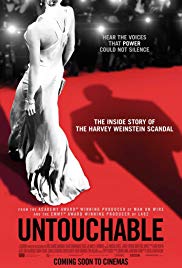
UNTOUCHABLE
US, 2019, 98 minutes, Colour.
Directed by Ursula Mac Farlane.
An ironic title for a film about film producer, Harvey Weinstein, and the cases against him, the testimony of many women who claim rape, attempted rape, molestation and harassment. It was released in September 2019 and its Australian television release coincided with the jury choice for Weinstein's trial, a week before the trial opened.
The case against Harvey Weinstein is perhaps the most high-profile case against a celebrity for sexual abuse of women. It led to the Me#Too Movement, an increasing awareness of sexual violence against women, a great number of exposes and prominent men losing their jobs in business, in the media. This can be seen in the television treatment of Roger Ailes Fox News, the Loudest Voice and the film, Bombshell.
For those who know a great deal of detail, have read the various articles, especially by Ronan Farrow in the New Yorker, the material will be familiar.
However, for those who have only a general awareness, this documentary could be most telling.
A number of women are given substantial screen time to tell their story, explain their experience and the reactions, make their case against Weinstein. A number of them are aspiring actresses, eager for a career, many feeling themselves trapped by Weinstein's impositions and demands. A number of the interviewees are women who worked for Weinstein or for his Miramax company. The film gives the opportunity not only to listen to the women but to appreciate their pauses, hesitations, some reluctance to speak, but the courage for response to the opportunity to speak out. The interviews seem very credible.
On the other hand, there is a portrait of Harvey Weinstein himself along with his producer brother, Bob Weinstein. There is his background in Brooklyn, his ambitions, moving to Buffalo and being a concert promoter, even some registering of complaints from Buffalo, 1978. He moved to New York City and, during the 1980s, learnt the business of independent production and distribution, having great success in 1989. The documentary also shows the success during the 1990s of the films that Miramax produced and distributed, Harvey Weinstein becoming more and more involved in promotion, high-profile socialisiing with his eye on Oscars, and Miramax films winning the Oscars for best film for 10 years.
The film then gives a profile of Weinstein himself, his self-consciousness about his appearance, his business skills, his growing demands on the women who work for him or who sought his help or to whom he offered help. What emerges is the portrait of a monstrous man not only in his dealings with women but in his angers and demands on those who work for him. There is a climax moment when two reporters try to interview him at a party and tape his angry remarks and his arrogant claim of being the sheriff in New York City.
There is interview material from Ronan Farrow and from other journalists.
Most audiences will not be familiar with the women who are interviewed except with the actress, Rosanna Arquette. There have been a number of well-known actresses who also made accusations but they are not included in this film. Perhaps the film is stronger by having women interviewed who are not so much in the public eye.
On the evidence of the testimonies in this film and the profiling of Weinstein himself from the media and from interviews, the case against him in the courts is very strong.